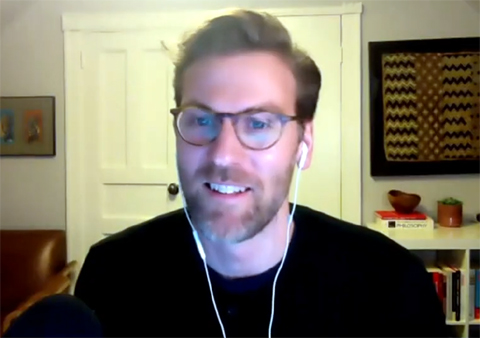|
 May
11, 2021
May
11, 2021
Truth and Propaganda in a Polarized Society
“What does it
mean to search after truth?” This question opened a spring 2021
presentation in the Big Ideas series to an online audience of over 80.
Dr. Geoff Cameron, a political scientist specializing in immigration
and refugee policy, and currently Director of Public Affairs for the
Canadian Baha’i community, spoke of propaganda, truth, the meaning of
freedom and the power of human speech. It was a kindly delivered
challenge.

‘Abdu’l-Bahá addressed the Paris Theosophical Society in 1912. Son of
the Faith’s founder, chosen to lead his followers into the 20th
century, ‘Abdu’l-Bahá praised the audience as seekers after truth, “the
first principle of Bahá’u’lláh”. Bahá’u’lláh made the unfettered
investigation of reality an obligation, but how do we seek it freely?
‘Abdu’l-Bahá established two conditions. First, relinquish prejudice,
the greatest hindrance to the quest. Second, recognize that truth,
though endless and profound, is essentially one. He
gave the example of religion: it is as the sun, a single source of
enlightenment, though arising from various points on the horizon of
history.
Cameron described propaganda as organized
opposition to truth-seeking, designed to control or influence whole
populations. Philosopher Jacques Ellul argued that “the structure of
society puts individuals into position to receive propaganda”,
suffocating independent thought. Its bluntest expression – there
are bad people out there who want to hurt you, and only we/I can
protect you – is only the tip of the iceberg. Beneath the
waterline lie subtler forms of propaganda.
The Internet could be a potent defence, giving voice to more people,
but it powerfully enables political, consumerist and pseudoscientific
propaganda, and compromises our ability to think.
In The Shallows, writer Nicholas Carr laments,
“[T]he Net…is chipping away my capacity for concentration and
contemplation….[M]y mind now expects to take in information the way the
Net distributes it…” Cameron noted that social media foster narrowness
and “are built to encourage snap judgements”, whether about
entertainment or ideological positions that derange civic discourse.

So how to search for truth? Cameron gave homework: root out our
prejudices; abandon triviality; examine our practices; consider social
media themselves. Do I really need to know this? Or like that?
He urged us to build our humility, detachment and moderation, freeing
ourselves from the snares of propaganda. “We also need to learn how to
consult with each other, to investigate reality together,” and not
those “consultations” that recruit a constituency for some existing
viewpoint. We must practice “wise and judicious speech”. He quoted
advice from a 1988 letter of the Universal House of Justice, the Bahá’í
world’s governing council: while “…freedom of expression [is] a
fundamental principle of the Cause…[it] must necessarily be
disciplined….[B]oth the limitation of speech and the excess of it can
lead to dire consequences.”
Above all, Bahá’ís strive to contribute to unity.
We cannot change our societies simply by appeals to free speech. It’s
obvious: our present discourse, even about freedom of expression, leads
inevitably to division, using speech for selfish, power-hungry ends.
Last July, the House of Justice wrote to the Bahá’ís of the United
States, consoling and advising them in their nation’s struggles with
racism, “a profound deviation from the standard of true morality”.
It is not possible for you to effect the transformation
envisioned by Bahá’u’lláh merely by adopting the perspectives,
practices, concepts, criticisms, and language of contemporary society.
Your approach, instead, will be distinguished by maintaining a humble
posture of learning,… consulting to harmonize differing views,…and
marching forward with unbreakable unity…
“To be a Bahá’í,” said Cameron, “is, among other things, to strive to
be open-minded.” His presentation was exemplary: “to listen well and to
speak well” are essential to a truth-seeking context, including what we
listen to. Ultimately, we must not disparage or ignore the two systems
of knowledge we have – science and religion. Contrary to much modern
propaganda, Bahá'í thought sees reason and faith as complementary.
Searching for truth is more than an assistance to finding common
ground. It’s fundamental to personal, spiritual thriving as well. “We
have a soul that is attuned to truth,” said Cameron. Truth-seeking is
necessary, natural and, yes, possible.
|
|


